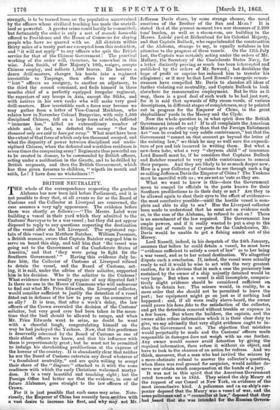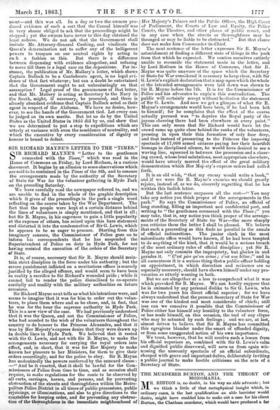BRITISH NEUTRALITY.
THE whole of the correspondence respecting the gunboat Alabama has now been laid before Parliament, and it is not possible to deny that, at all events so far as the Board of Customs and the Collector at Liverpool are concerned, the case assumes a very ugly appearance. The evidence before them was shortly as follows :—" The Messrs. Laird were building a vessel in their yard which they admitted to the Customs' Surveyor to be a war vessel ; but they did not appear disposed to reply to any questions respecting the destination of the vessel after she left Liverpool. The registered cap- tain of this vessel was Matthew Butcher. William Passmore, a British seaman, swore that Captain Butcher engaged him to serve on board this ship, and told him that the vessel was going out to the Government of the Confederate States of America,' and that they were going to fight for the Southern Government.'" Having this evidence duly be- fore him, the Collector of Customs at Liverpool refused to detain the vessel, and the Board of Customs, act- ing, it is said, under the advice of their solicitor, supported him in his decision. Who is the solicitor to the Customs? What evidence does he usually require of any disputed fact? Is there no one in the House of Commons who will endeavour to find out what Mr. Price Edwards, the Liverpool collector, would consider sufficient to justify the detention of a vessel fitted out in defiance of the law to prey on the commerce of an ally ? It is true, that after a week's delay, the law officers of the Crown overruled the decision of the Customs' solicitor, but very good care had been taken in the mean- time that the bird should be allowed to escape, and when Mr. Price Edwards went to seize, no doubt he went with a cheerful laugh, congratulating himself on the way he had jockeyed the Yankees. Now, that this gentleman is deservedly esteemed by the Board of Customs as one of their ablest officers we know, and that his influence with them is proportionately great ; but he must not be permitted to indulge his slaveholding predilections at the expense of the honour of the country. It is abundantly clear that neither he nor the Board of Customs entertain any dread whatever of "a fraudulent neutrality," and are quite willing to accept their share of the " disgrace " attached to it with the same readiness with which the early Christians welcomed martyr- dom. It is a very beautiful and touching sight ; but the Foreign Office had better see that the evidence, in case of future Alabamas, goes straight to the law officers of the Crown.
Fer it is just possible that such eases may arise. Noto- riously, the Emperor of China has recently been-smitten with a vast desire to increase his fleet, and why may not Mr.
Jefferson Davis share, by some strange chance, the naval emotions of the Brother of the Sun and Afton? It is stated that at the present moment two war steamers of 2,200 tons' burden, as well as a steam-ram, are building in the Messrs. Lairds' yard at Birkenhead for his Celestial Majesty, and that Captain Bullock, who superintended the construction of the Alabama, strange to say, is equally sedulous in his attention to the progress of these vessels. On the 12th July last, the Captain was certainly acting under the orders of Mr. Mallory, the Secretary of the Confederate States Navy, for- a letter distinctly proving as much has been intercepted and published by the orders of Mr. Seward ; but doubtless the hope of profit or caprice has induced him to transfer his allegiance' or it may be that Lord Russell's energetic remon- strances have compelled Mr. Davis to abandon all ideas of further violating our neutrality, and Captain Bullock to look elsewhere for remunerative employment. But be this as it may, there is a good deal of such work to be had just now, for it is said that upwards of fifty steam-vessls, of various descriptions, in different stages of completeness, may be pointed out in progress for the Emperor of China, in the great shipbuilders' yards in the Mersey and the Clyde. Now the whole question is, in what spirit does the British Government intend to act? If to all complaints the American Minister gets no other reply than that the Foreign Enlistment Act "can be evaded by very subtle contrivances," but that the- Government "cannot on that account go beyond the letter of the existing law," we think he may as well save the expendi- ture of pen and ink incurred in writing them. But what a new-born babe, what a very " chrysom child" of innocence Lord Russell must be, if he considers that Captains Bullock and Butcher resorted to very subtle contrivances to conceal their purpose. And they are likely to be so much deeper now-- How is a poor Collector of Customs to see through such a fog as calling Jefferson Davis the Emperor of China? The Yankees must be merciful with us ; we are not so 'cute as they are.
What we want to know is this—does the Government mean to compel its officials in the ports known for their Southern predilections to do their duty or not'? Are they to. be allowed again to shut their eyes to the effect of evidence— the most conclusive possible—until the hostile vessel is com- plete and able to slip to sea? Has the Liverpool collector been made to understand that he must act on evidence such as, in the case of the Alabama, he refused to act on ? There is no amendment of the law required. The Government has- ample powers, and if it really wanted to put a stop to the fitting out of vessels in our ports for the Confederates, Mr. Davis would be unable to get a fishing smack out of the Mersey. Lord Russell, indeed, in his despatch of the 24th January,, assumes that before he could detain a vessel, he must have "evidence sufficient to satisfy a court of law" as to her being a war vessel, and as to her actual destination. We altogether dispute such a conclusion. If, indeed, the vessel were actually ready to sail it would be wise to act with the very greatest caution, for it is obvious that in such a case the pecuniary loss sustained by the owner of a ship unjustly detained would be very large. But when a vessel is still incomplete, compara- tively slight evidence should be considered sufficient on which to detain her. The seizure would, in reality, be a mere order that she should not be permitted to leave the port ; her equipment might go on just as if nothing had happened : and, if all were really above-board, the owner could prove his bona fides to the satisfaction of the collector, and get the detention removed without trouble or expense in a few hours. But where the builders, the captain, and the owner alike refuse information which it is their clear duty to give, we say advisedly that very slight evidence ought to in- duce the Government to act. The objection that mistakes would perpetually be made and the Customs' officers made responsible in damages does not weigh with us one feather. Any owner would sooner avoid detention by giving the required information, than refuse it without an object, and have to look to the chances of an action for redress. And we think, moreover, that a man who had invited the seizure by a mere obstinate refusal to answer the collector's questions, when there was real ground for suspicion, would neither de- serve nor obtain much compensation at the bands of a jury.
It was not in this spirit that the American Government acted towards us in 1855. They seized the ship Maury at the request of our Consul at New York, on evidence of the most inconclusive kind. I policeman and an ex-ship's-car- penter deposed that the Maury was a vessel of war, and the same policeman and a "counsellor at law," deposed that they had _heard that she was intended for the Russian Goverar
snout—and this was all. In a day or two the owners pro- duced evidence of such a sort that the Consul himself was in very shame obliged to ask that the proceedings might be stopped ; yet the owners have never to this day obtained the least redress. We do not ask that the Government shall imitate Mr. Attorney-General Cushing, and vindicate the Queen's determination not to suffer any of the belligerent powers to trespass on our neutral rights by acting in such a fashion as this. But there is a difference between dispensing with evidence altogether, and refusing to move till there is a legal case on the depositions. For in- stance, the publication of Mr. Mallory's letter, which shows Captain Bullock to be a Confederate agent, is no legal evi- dence of that fact whatever; but can a doubt be entertained that the Government ought to act unhesitatingly on that assumption ? Legal proof of the genuineness of that letter, and that Mr. Mallory is acting as Secretary to the Navy in the South, might, if necessary, be procured, and there is already abundant evidence that Captain Bullock acted as their agent in respect of the Alabama. We hare no desire, how- ever, to see the hands of the Government tied. Let every case be judged on its own merits. But let us do by the United States as the United .States in 1855 did by us, and show that we are determined to put a stop to expeditions which are utterly at variance with even the semblance of neutrality, and which the executive by every consideration of dignity or honour is bound to defeat.































 Previous page
Previous page